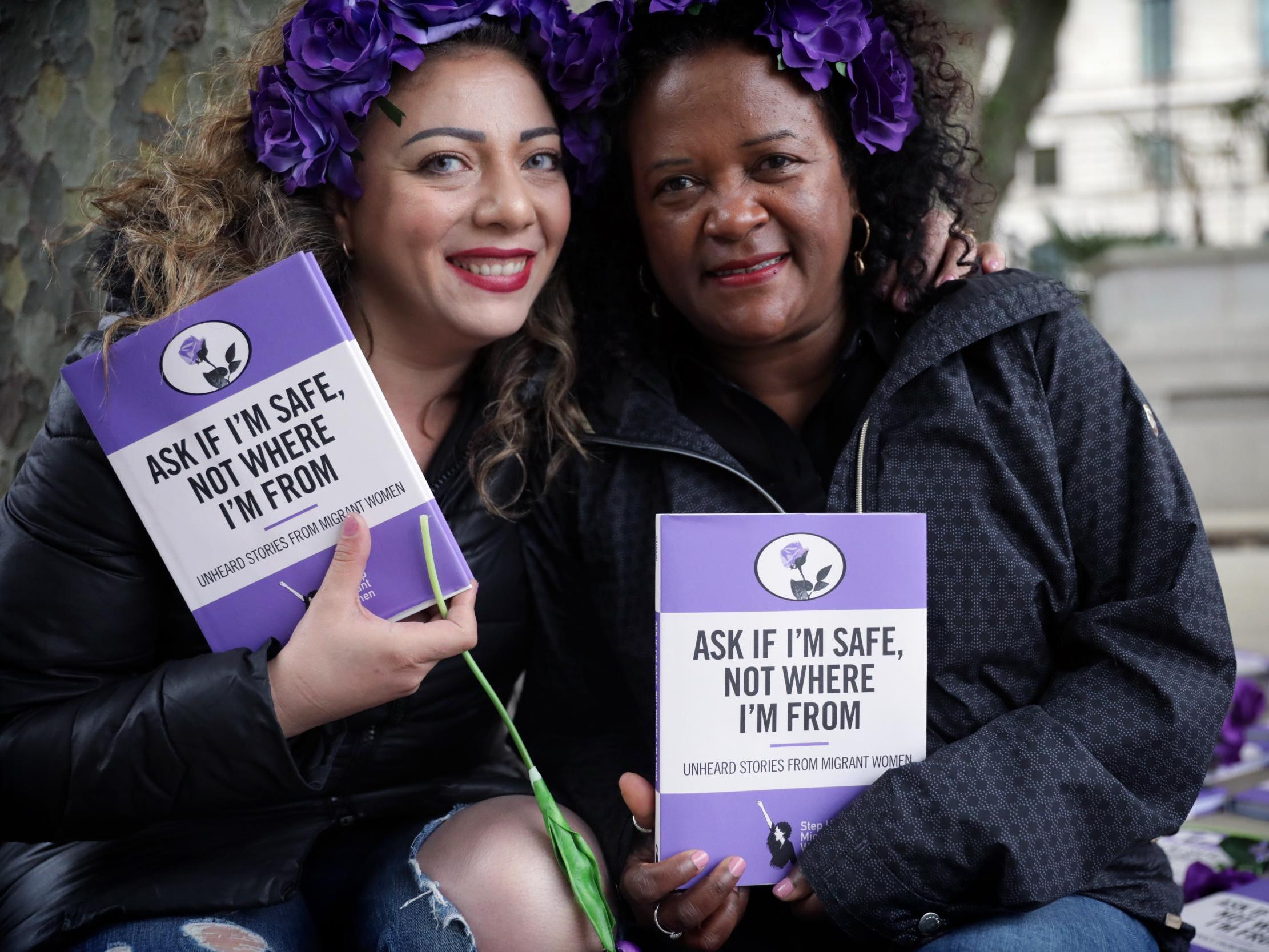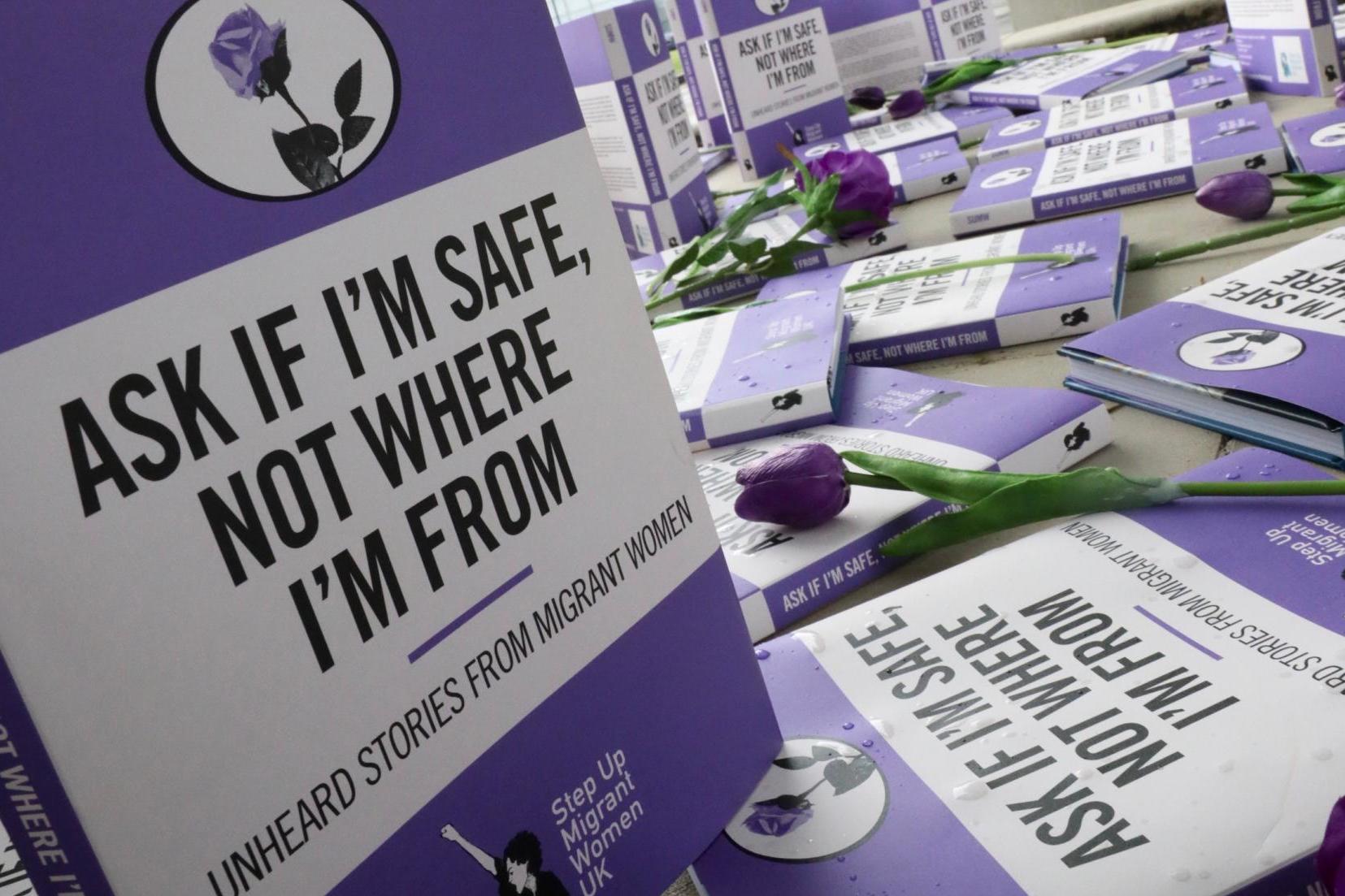Migrant women protest in Westminster over controversial domestic abuse bill
'He and his mother hid my passport away from me and he told me I would never be believed and that he would take our children away from me,' says domestic abuse survivor

Your support helps us to tell the story
From reproductive rights to climate change to Big Tech, The Independent is on the ground when the story is developing. Whether it's investigating the financials of Elon Musk's pro-Trump PAC or producing our latest documentary, 'The A Word', which shines a light on the American women fighting for reproductive rights, we know how important it is to parse out the facts from the messaging.
At such a critical moment in US history, we need reporters on the ground. Your donation allows us to keep sending journalists to speak to both sides of the story.
The Independent is trusted by Americans across the entire political spectrum. And unlike many other quality news outlets, we choose not to lock Americans out of our reporting and analysis with paywalls. We believe quality journalism should be available to everyone, paid for by those who can afford it.
Your support makes all the difference.Migrant women who have endured domestic violence held a protest in Westminster to oppose a landmark domestic abuse bill they argue will fail to keep them safe.
Campaigners warn perpetrators are using migrant women’s immigration status as a “weapon to abuse” them, and many are too fearful to report violence to the police or other services due to the “real risk” of being detained or deported.
Survivors and frontline service staff scattered purple flowers and laid dozens of purple books representing their “unheard stories” on Parliament Square on Thursday morning in a bid to make the government offer protection to migrant and black, asian and minority ethnic (Bame) women in the forthcoming bill.
The protest, which was organised by the Step Up Migrant Women coalition of 40 organisations, comes ahead of the parliamentary scrutiny committee publishing its report on the draft legislation.
The joint committee on the draft bill is expected to issue its report on Friday, giving MPs their first formal scrutiny of the bill.
Step Up Migrant Women warned that the bill in its current form would leave thousands of survivors without vital protections because of their race, ethnicity, nationality and immigration status.
Illary Valenzuela-Oblitas, coordinator of the coalition, said: “Migrant women are blocked from reporting violence to the police or GPs for fear they will be treated as suspects and face detention or deportation.
“The absolute priority should be making sure these women are safe – protected from abusers and able to escape violence by accessing life-saving refuge accommodation. Migrant women deserve to be heard and deserve safety.”
Demonstrators, who gathered by the Millicent Fawcett statue, laid books with a Penguin Classic-style front cover that read “Ask if I’m safe, not where I’m from: Unheard stories from migrant women”. They laid down flowers and wore black clothing and purple – a colour symbolic of domestic abuse awareness – flower crowns.

Isabela, a survivor of domestic abuse, said a lack of protections for migrant women left her in a desperate situation.
“I was convinced by my British ex-husband that I had a spousal visa, but he had refused to apply for one as soon as I arrived to the UK,” she said. “I continued to undergo domestic violence from my then husband who threatened me repeatedly with deportation. He and his mother hid my passport away from me and he told me I would never be believed and that he would take our children away from me. I was refused support from the police and was made homeless and destitute. I was also told I had no custody over my child because I was undocumented.”
This comes after a report recently found two in three migrant women who are victims of gender-based violence fear reporting to the police.
The study, conducted by the Latin American Women’s Rights Service and King’s College London, from last month revealed the “shocking treatment” of migrant survivors by police and statutory organisations that should be providing them with support and safety. More than half feared the police would side with the perpetrator.
The research was based on a survey of 50 migrant women living in London who have experienced insecure immigration status and gender-based violence as well as a further 21 interviews and two focus groups with migrant women and service providers.
Chiara Capraro, of Amnesty International, who are part of the coalition, said: “Black and minority ethnic (BME) women face domestic abuse in specific ways and there is evidence that their needs are often not understood or met by general services. They are more likely to require support around housing, immigration and welfare.
“However specialist services set up ‘by and for’ BME women are few and far between and have been decimated by cuts to local funding as well as the move towards funding generalist providers to contain costs."
Ms Capraro said the draft bill includes the provision of £300,000 for Bame organisations that are supporting survivors of abuse but argued the figure would “hardly make a dent” to the sum needed to keep the sector afloat.
The Joint Committee on Human Rights hit out at the bill suggesting it does not meet the requirements of the Istanbul convention – the most comprehensive legal framework that exists to tackle violence against women and girls, covering domestic violence, rape, sexual assault, female genital mutilation, so-called honour-based violence and forced marriage.
David Cameron, the former prime minister, signed the convention in 2012 but it has still not been ratified – meaning it is currently in limbo and the UK is not legally bound to follow it. The UK is one of the last EU members – along with Bulgaria, Hungary and a handful of others – to ratify the convention.
While guidance is already in place for police forces to support domestic violence victims, they often share data with the Home Office. As a result, the victims can be treated as suspects by immigration officials – something the new legislation fails to address by ensuring they could access support services such as refuges.
Instead, the government suggests some victims of domestic abuse “may be best served by returning to their country of origin and, where it is available, to the support of their family and friends”.
Join our commenting forum
Join thought-provoking conversations, follow other Independent readers and see their replies
Comments